Way in which war has changed after end of Cold War
VerifiedAdded on 2023/01/12
|7
|1911
|39
AI Summary
This article examines the changes in war after the end of the Cold War, focusing on the shift in ideologies and the impact of technology. It explores the causes of war through different levels of analysis and discusses the effects of globalization and privatization on international relations.
Contribute Materials
Your contribution can guide someone’s learning journey. Share your
documents today.

WAY IN WHICH WAR HAS
CHANGED AFTER END OF
COLD WAR
CHANGED AFTER END OF
COLD WAR
Secure Best Marks with AI Grader
Need help grading? Try our AI Grader for instant feedback on your assignments.
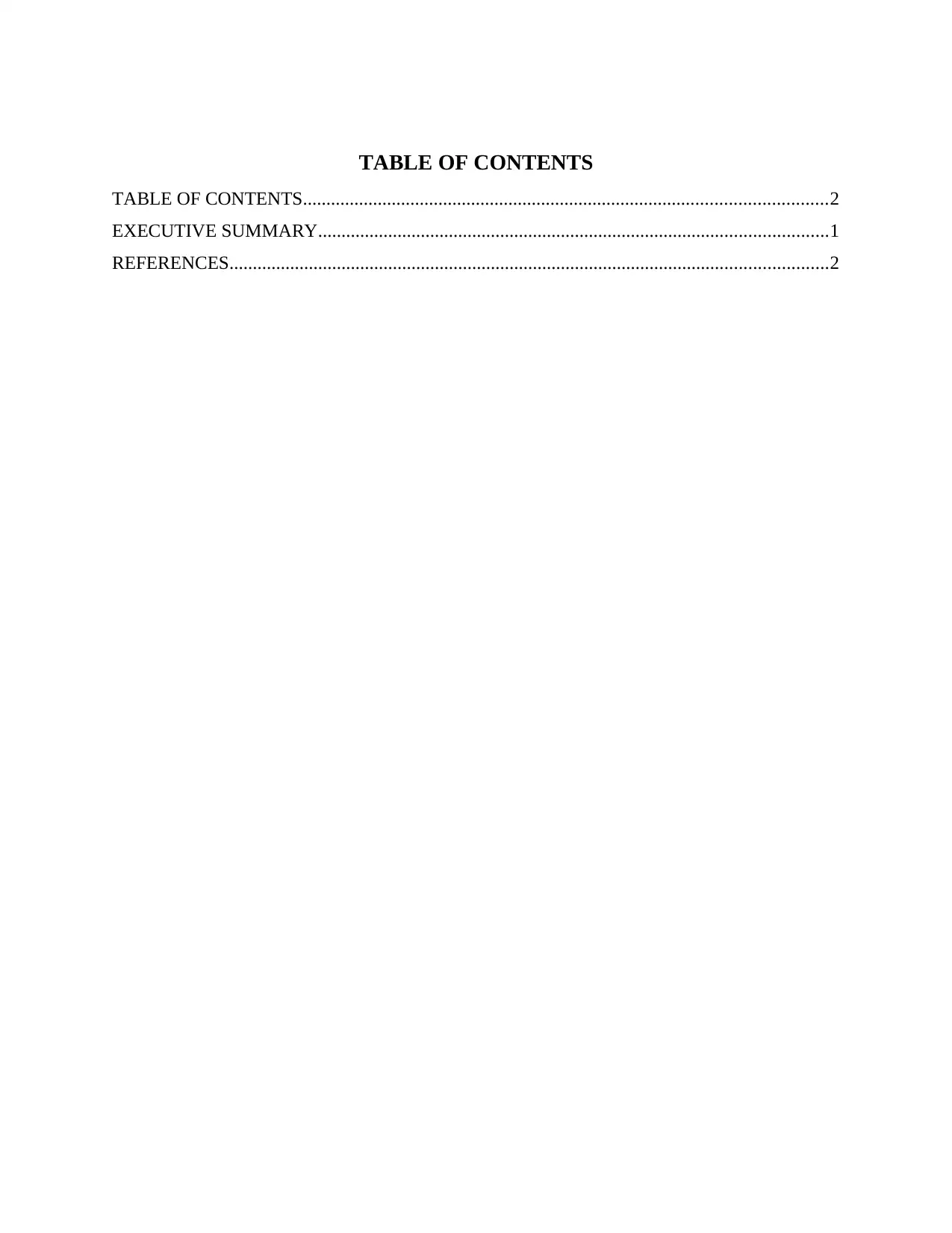
TABLE OF CONTENTS
TABLE OF CONTENTS................................................................................................................2
EXECUTIVE SUMMARY.............................................................................................................1
REFERENCES................................................................................................................................2
TABLE OF CONTENTS................................................................................................................2
EXECUTIVE SUMMARY.............................................................................................................1
REFERENCES................................................................................................................................2
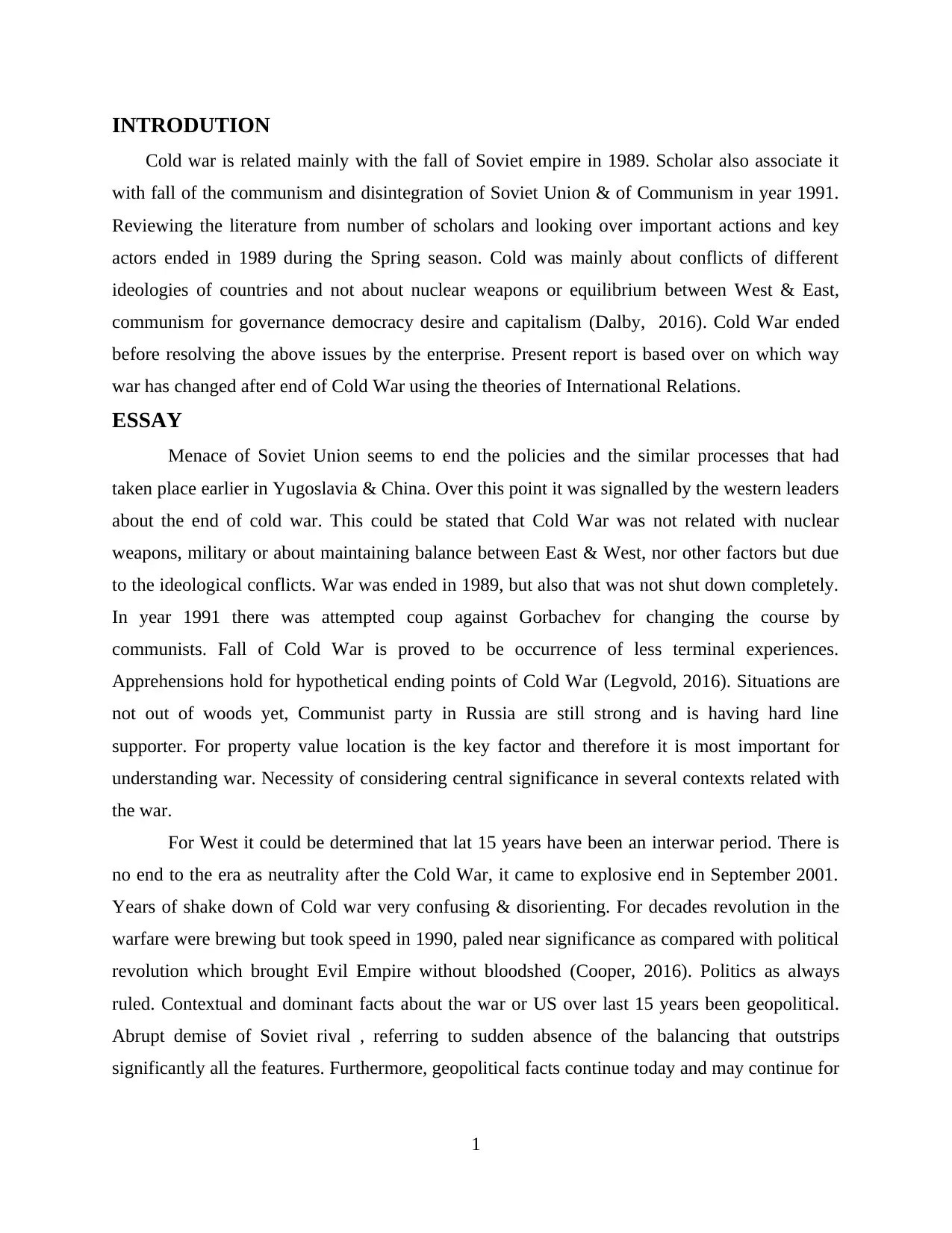
INTRODUTION
Cold war is related mainly with the fall of Soviet empire in 1989. Scholar also associate it
with fall of the communism and disintegration of Soviet Union & of Communism in year 1991.
Reviewing the literature from number of scholars and looking over important actions and key
actors ended in 1989 during the Spring season. Cold was mainly about conflicts of different
ideologies of countries and not about nuclear weapons or equilibrium between West & East,
communism for governance democracy desire and capitalism (Dalby, 2016). Cold War ended
before resolving the above issues by the enterprise. Present report is based over on which way
war has changed after end of Cold War using the theories of International Relations.
ESSAY
Menace of Soviet Union seems to end the policies and the similar processes that had
taken place earlier in Yugoslavia & China. Over this point it was signalled by the western leaders
about the end of cold war. This could be stated that Cold War was not related with nuclear
weapons, military or about maintaining balance between East & West, nor other factors but due
to the ideological conflicts. War was ended in 1989, but also that was not shut down completely.
In year 1991 there was attempted coup against Gorbachev for changing the course by
communists. Fall of Cold War is proved to be occurrence of less terminal experiences.
Apprehensions hold for hypothetical ending points of Cold War (Legvold, 2016). Situations are
not out of woods yet, Communist party in Russia are still strong and is having hard line
supporter. For property value location is the key factor and therefore it is most important for
understanding war. Necessity of considering central significance in several contexts related with
the war.
For West it could be determined that lat 15 years have been an interwar period. There is
no end to the era as neutrality after the Cold War, it came to explosive end in September 2001.
Years of shake down of Cold war very confusing & disorienting. For decades revolution in the
warfare were brewing but took speed in 1990, paled near significance as compared with political
revolution which brought Evil Empire without bloodshed (Cooper, 2016). Politics as always
ruled. Contextual and dominant facts about the war or US over last 15 years been geopolitical.
Abrupt demise of Soviet rival , referring to sudden absence of the balancing that outstrips
significantly all the features. Furthermore, geopolitical facts continue today and may continue for
1
Cold war is related mainly with the fall of Soviet empire in 1989. Scholar also associate it
with fall of the communism and disintegration of Soviet Union & of Communism in year 1991.
Reviewing the literature from number of scholars and looking over important actions and key
actors ended in 1989 during the Spring season. Cold was mainly about conflicts of different
ideologies of countries and not about nuclear weapons or equilibrium between West & East,
communism for governance democracy desire and capitalism (Dalby, 2016). Cold War ended
before resolving the above issues by the enterprise. Present report is based over on which way
war has changed after end of Cold War using the theories of International Relations.
ESSAY
Menace of Soviet Union seems to end the policies and the similar processes that had
taken place earlier in Yugoslavia & China. Over this point it was signalled by the western leaders
about the end of cold war. This could be stated that Cold War was not related with nuclear
weapons, military or about maintaining balance between East & West, nor other factors but due
to the ideological conflicts. War was ended in 1989, but also that was not shut down completely.
In year 1991 there was attempted coup against Gorbachev for changing the course by
communists. Fall of Cold War is proved to be occurrence of less terminal experiences.
Apprehensions hold for hypothetical ending points of Cold War (Legvold, 2016). Situations are
not out of woods yet, Communist party in Russia are still strong and is having hard line
supporter. For property value location is the key factor and therefore it is most important for
understanding war. Necessity of considering central significance in several contexts related with
the war.
For West it could be determined that lat 15 years have been an interwar period. There is
no end to the era as neutrality after the Cold War, it came to explosive end in September 2001.
Years of shake down of Cold war very confusing & disorienting. For decades revolution in the
warfare were brewing but took speed in 1990, paled near significance as compared with political
revolution which brought Evil Empire without bloodshed (Cooper, 2016). Politics as always
ruled. Contextual and dominant facts about the war or US over last 15 years been geopolitical.
Abrupt demise of Soviet rival , referring to sudden absence of the balancing that outstrips
significantly all the features. Furthermore, geopolitical facts continue today and may continue for
1
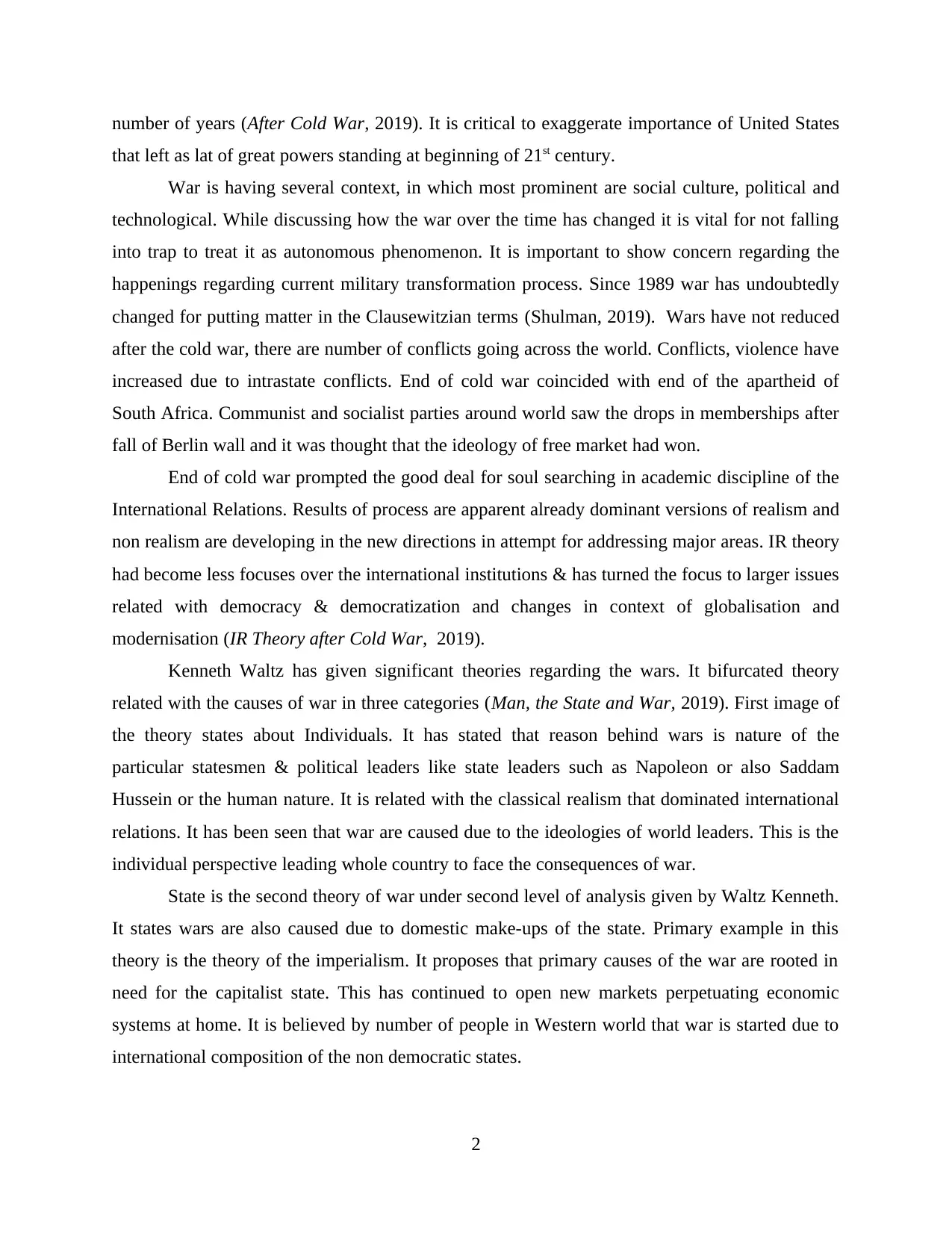
number of years (After Cold War, 2019). It is critical to exaggerate importance of United States
that left as lat of great powers standing at beginning of 21st century.
War is having several context, in which most prominent are social culture, political and
technological. While discussing how the war over the time has changed it is vital for not falling
into trap to treat it as autonomous phenomenon. It is important to show concern regarding the
happenings regarding current military transformation process. Since 1989 war has undoubtedly
changed for putting matter in the Clausewitzian terms (Shulman, 2019). Wars have not reduced
after the cold war, there are number of conflicts going across the world. Conflicts, violence have
increased due to intrastate conflicts. End of cold war coincided with end of the apartheid of
South Africa. Communist and socialist parties around world saw the drops in memberships after
fall of Berlin wall and it was thought that the ideology of free market had won.
End of cold war prompted the good deal for soul searching in academic discipline of the
International Relations. Results of process are apparent already dominant versions of realism and
non realism are developing in the new directions in attempt for addressing major areas. IR theory
had become less focuses over the international institutions & has turned the focus to larger issues
related with democracy & democratization and changes in context of globalisation and
modernisation (IR Theory after Cold War, 2019).
Kenneth Waltz has given significant theories regarding the wars. It bifurcated theory
related with the causes of war in three categories (Man, the State and War, 2019). First image of
the theory states about Individuals. It has stated that reason behind wars is nature of the
particular statesmen & political leaders like state leaders such as Napoleon or also Saddam
Hussein or the human nature. It is related with the classical realism that dominated international
relations. It has been seen that war are caused due to the ideologies of world leaders. This is the
individual perspective leading whole country to face the consequences of war.
State is the second theory of war under second level of analysis given by Waltz Kenneth.
It states wars are also caused due to domestic make-ups of the state. Primary example in this
theory is the theory of the imperialism. It proposes that primary causes of the war are rooted in
need for the capitalist state. This has continued to open new markets perpetuating economic
systems at home. It is believed by number of people in Western world that war is started due to
international composition of the non democratic states.
2
that left as lat of great powers standing at beginning of 21st century.
War is having several context, in which most prominent are social culture, political and
technological. While discussing how the war over the time has changed it is vital for not falling
into trap to treat it as autonomous phenomenon. It is important to show concern regarding the
happenings regarding current military transformation process. Since 1989 war has undoubtedly
changed for putting matter in the Clausewitzian terms (Shulman, 2019). Wars have not reduced
after the cold war, there are number of conflicts going across the world. Conflicts, violence have
increased due to intrastate conflicts. End of cold war coincided with end of the apartheid of
South Africa. Communist and socialist parties around world saw the drops in memberships after
fall of Berlin wall and it was thought that the ideology of free market had won.
End of cold war prompted the good deal for soul searching in academic discipline of the
International Relations. Results of process are apparent already dominant versions of realism and
non realism are developing in the new directions in attempt for addressing major areas. IR theory
had become less focuses over the international institutions & has turned the focus to larger issues
related with democracy & democratization and changes in context of globalisation and
modernisation (IR Theory after Cold War, 2019).
Kenneth Waltz has given significant theories regarding the wars. It bifurcated theory
related with the causes of war in three categories (Man, the State and War, 2019). First image of
the theory states about Individuals. It has stated that reason behind wars is nature of the
particular statesmen & political leaders like state leaders such as Napoleon or also Saddam
Hussein or the human nature. It is related with the classical realism that dominated international
relations. It has been seen that war are caused due to the ideologies of world leaders. This is the
individual perspective leading whole country to face the consequences of war.
State is the second theory of war under second level of analysis given by Waltz Kenneth.
It states wars are also caused due to domestic make-ups of the state. Primary example in this
theory is the theory of the imperialism. It proposes that primary causes of the war are rooted in
need for the capitalist state. This has continued to open new markets perpetuating economic
systems at home. It is believed by number of people in Western world that war is started due to
international composition of the non democratic states.
2
Secure Best Marks with AI Grader
Need help grading? Try our AI Grader for instant feedback on your assignments.
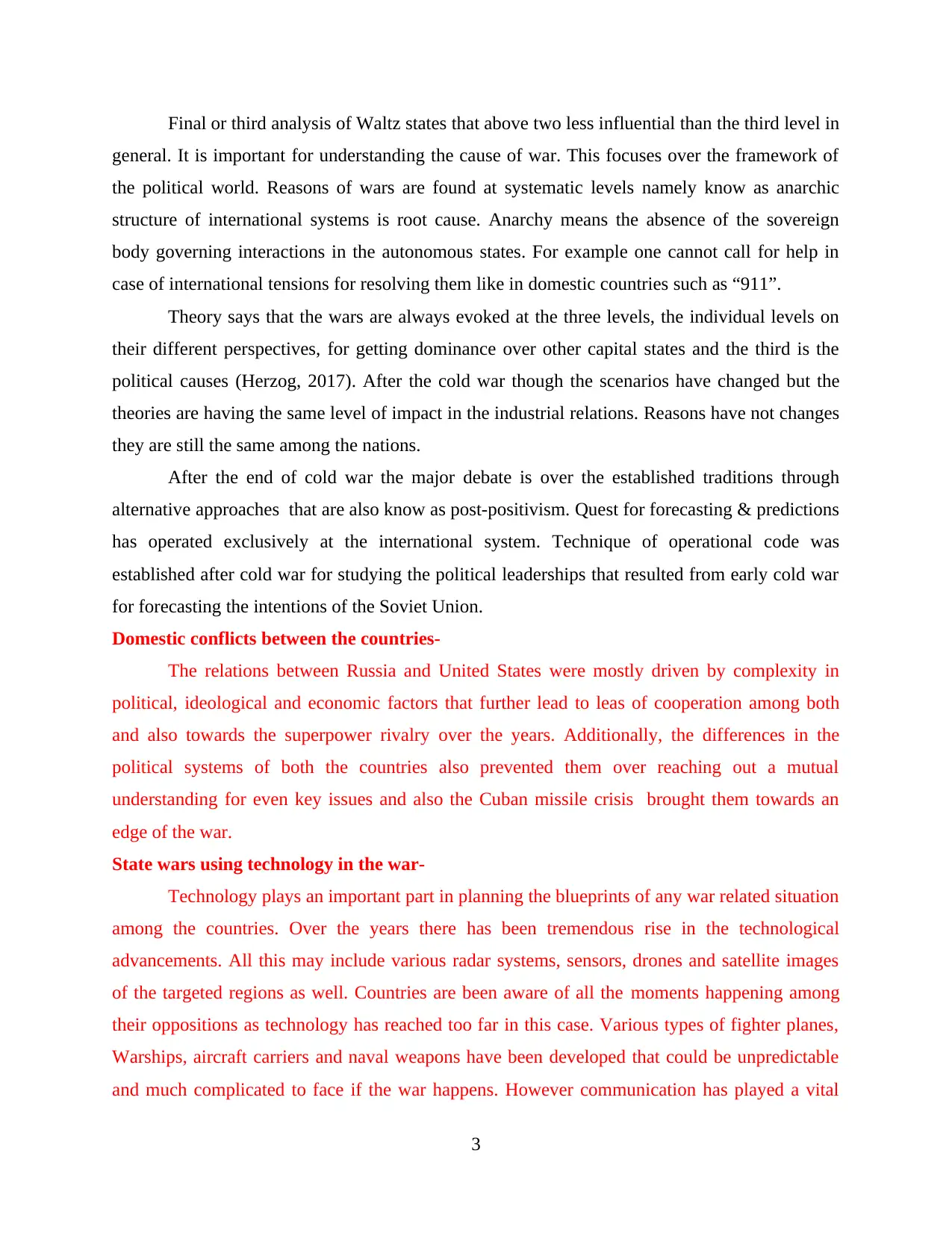
Final or third analysis of Waltz states that above two less influential than the third level in
general. It is important for understanding the cause of war. This focuses over the framework of
the political world. Reasons of wars are found at systematic levels namely know as anarchic
structure of international systems is root cause. Anarchy means the absence of the sovereign
body governing interactions in the autonomous states. For example one cannot call for help in
case of international tensions for resolving them like in domestic countries such as “911”.
Theory says that the wars are always evoked at the three levels, the individual levels on
their different perspectives, for getting dominance over other capital states and the third is the
political causes (Herzog, 2017). After the cold war though the scenarios have changed but the
theories are having the same level of impact in the industrial relations. Reasons have not changes
they are still the same among the nations.
After the end of cold war the major debate is over the established traditions through
alternative approaches that are also know as post-positivism. Quest for forecasting & predictions
has operated exclusively at the international system. Technique of operational code was
established after cold war for studying the political leaderships that resulted from early cold war
for forecasting the intentions of the Soviet Union.
Domestic conflicts between the countries-
The relations between Russia and United States were mostly driven by complexity in
political, ideological and economic factors that further lead to leas of cooperation among both
and also towards the superpower rivalry over the years. Additionally, the differences in the
political systems of both the countries also prevented them over reaching out a mutual
understanding for even key issues and also the Cuban missile crisis brought them towards an
edge of the war.
State wars using technology in the war-
Technology plays an important part in planning the blueprints of any war related situation
among the countries. Over the years there has been tremendous rise in the technological
advancements. All this may include various radar systems, sensors, drones and satellite images
of the targeted regions as well. Countries are been aware of all the moments happening among
their oppositions as technology has reached too far in this case. Various types of fighter planes,
Warships, aircraft carriers and naval weapons have been developed that could be unpredictable
and much complicated to face if the war happens. However communication has played a vital
3
general. It is important for understanding the cause of war. This focuses over the framework of
the political world. Reasons of wars are found at systematic levels namely know as anarchic
structure of international systems is root cause. Anarchy means the absence of the sovereign
body governing interactions in the autonomous states. For example one cannot call for help in
case of international tensions for resolving them like in domestic countries such as “911”.
Theory says that the wars are always evoked at the three levels, the individual levels on
their different perspectives, for getting dominance over other capital states and the third is the
political causes (Herzog, 2017). After the cold war though the scenarios have changed but the
theories are having the same level of impact in the industrial relations. Reasons have not changes
they are still the same among the nations.
After the end of cold war the major debate is over the established traditions through
alternative approaches that are also know as post-positivism. Quest for forecasting & predictions
has operated exclusively at the international system. Technique of operational code was
established after cold war for studying the political leaderships that resulted from early cold war
for forecasting the intentions of the Soviet Union.
Domestic conflicts between the countries-
The relations between Russia and United States were mostly driven by complexity in
political, ideological and economic factors that further lead to leas of cooperation among both
and also towards the superpower rivalry over the years. Additionally, the differences in the
political systems of both the countries also prevented them over reaching out a mutual
understanding for even key issues and also the Cuban missile crisis brought them towards an
edge of the war.
State wars using technology in the war-
Technology plays an important part in planning the blueprints of any war related situation
among the countries. Over the years there has been tremendous rise in the technological
advancements. All this may include various radar systems, sensors, drones and satellite images
of the targeted regions as well. Countries are been aware of all the moments happening among
their oppositions as technology has reached too far in this case. Various types of fighter planes,
Warships, aircraft carriers and naval weapons have been developed that could be unpredictable
and much complicated to face if the war happens. However communication has played a vital
3
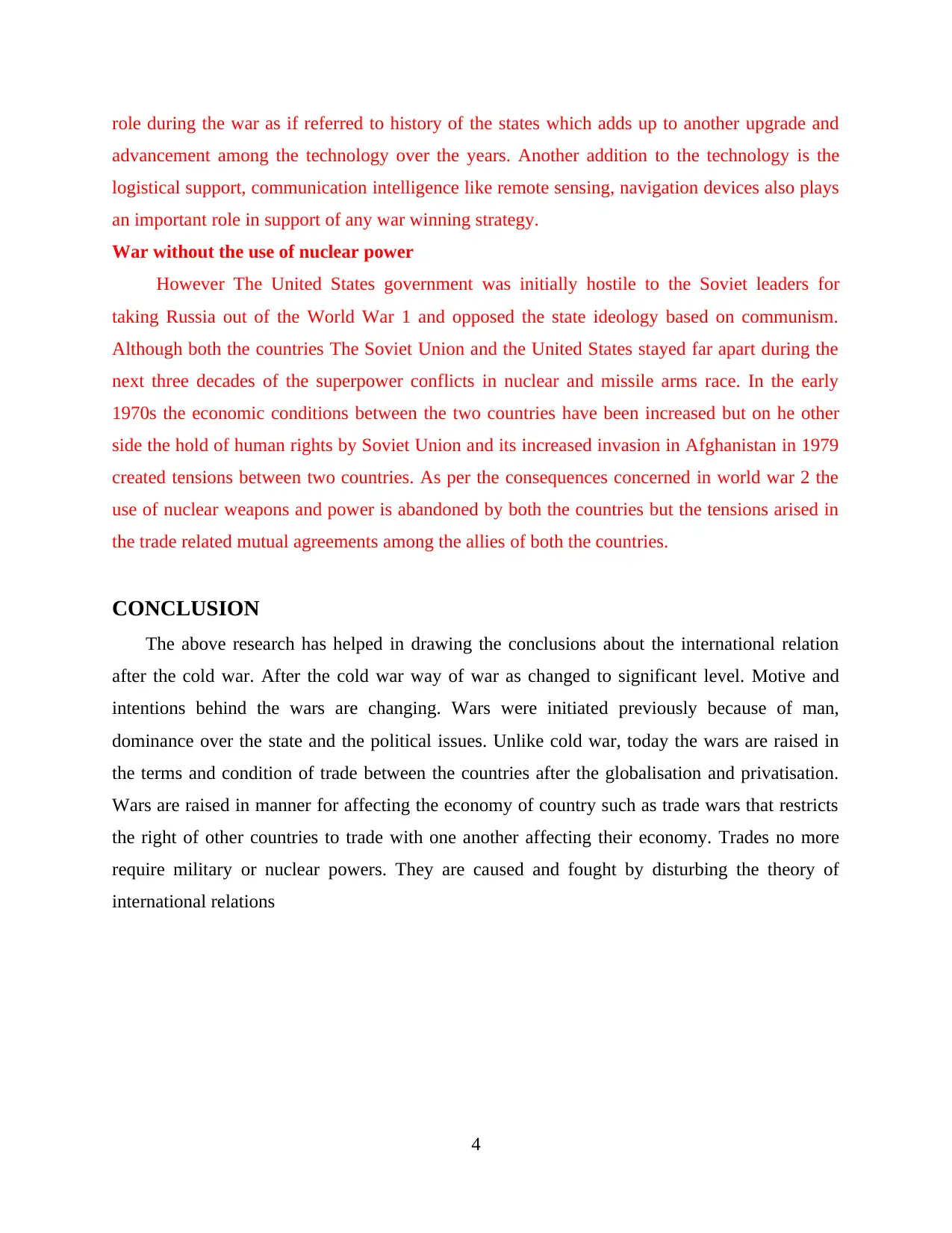
role during the war as if referred to history of the states which adds up to another upgrade and
advancement among the technology over the years. Another addition to the technology is the
logistical support, communication intelligence like remote sensing, navigation devices also plays
an important role in support of any war winning strategy.
War without the use of nuclear power
However The United States government was initially hostile to the Soviet leaders for
taking Russia out of the World War 1 and opposed the state ideology based on communism.
Although both the countries The Soviet Union and the United States stayed far apart during the
next three decades of the superpower conflicts in nuclear and missile arms race. In the early
1970s the economic conditions between the two countries have been increased but on he other
side the hold of human rights by Soviet Union and its increased invasion in Afghanistan in 1979
created tensions between two countries. As per the consequences concerned in world war 2 the
use of nuclear weapons and power is abandoned by both the countries but the tensions arised in
the trade related mutual agreements among the allies of both the countries.
CONCLUSION
The above research has helped in drawing the conclusions about the international relation
after the cold war. After the cold war way of war as changed to significant level. Motive and
intentions behind the wars are changing. Wars were initiated previously because of man,
dominance over the state and the political issues. Unlike cold war, today the wars are raised in
the terms and condition of trade between the countries after the globalisation and privatisation.
Wars are raised in manner for affecting the economy of country such as trade wars that restricts
the right of other countries to trade with one another affecting their economy. Trades no more
require military or nuclear powers. They are caused and fought by disturbing the theory of
international relations
4
advancement among the technology over the years. Another addition to the technology is the
logistical support, communication intelligence like remote sensing, navigation devices also plays
an important role in support of any war winning strategy.
War without the use of nuclear power
However The United States government was initially hostile to the Soviet leaders for
taking Russia out of the World War 1 and opposed the state ideology based on communism.
Although both the countries The Soviet Union and the United States stayed far apart during the
next three decades of the superpower conflicts in nuclear and missile arms race. In the early
1970s the economic conditions between the two countries have been increased but on he other
side the hold of human rights by Soviet Union and its increased invasion in Afghanistan in 1979
created tensions between two countries. As per the consequences concerned in world war 2 the
use of nuclear weapons and power is abandoned by both the countries but the tensions arised in
the trade related mutual agreements among the allies of both the countries.
CONCLUSION
The above research has helped in drawing the conclusions about the international relation
after the cold war. After the cold war way of war as changed to significant level. Motive and
intentions behind the wars are changing. Wars were initiated previously because of man,
dominance over the state and the political issues. Unlike cold war, today the wars are raised in
the terms and condition of trade between the countries after the globalisation and privatisation.
Wars are raised in manner for affecting the economy of country such as trade wars that restricts
the right of other countries to trade with one another affecting their economy. Trades no more
require military or nuclear powers. They are caused and fought by disturbing the theory of
international relations
4

REFERENCES
Books and Journals
Dalby, S., 2016. Creating the second Cold War: The discourse of politics. Bloomsbury
Publishing.
Legvold, R., 2016. Return to cold war. John Wiley & Sons.
Cooper, A.F. ed., 2016. Niche diplomacy: Middle powers after the Cold War. Springer.
Herzog, D., 2017. Cold War Freud. Cambridge University Press.
Shulman, M.D., 2019. Beyond the Cold War. Routledge.
Online
IR Theory after Cold War. 2019. [Online]. Available through :
< https://www.jstor.org/stable/20097562?read-now=1&seq=3#page_scan_tab_contents>.
Man, the State and War. 2019. [Online]. Available through :
<https://www.tandfonline.com/doi/abs/10.1080/10848770.2019.1692597?
scroll=top&needAccess=true&journalCode=cele20>.
After Cold War. 2019. [Online]. Available through :
<https://www.nytimes.com/1989/02/05/magazine/after-the-cold-war.html>.
5
Books and Journals
Dalby, S., 2016. Creating the second Cold War: The discourse of politics. Bloomsbury
Publishing.
Legvold, R., 2016. Return to cold war. John Wiley & Sons.
Cooper, A.F. ed., 2016. Niche diplomacy: Middle powers after the Cold War. Springer.
Herzog, D., 2017. Cold War Freud. Cambridge University Press.
Shulman, M.D., 2019. Beyond the Cold War. Routledge.
Online
IR Theory after Cold War. 2019. [Online]. Available through :
< https://www.jstor.org/stable/20097562?read-now=1&seq=3#page_scan_tab_contents>.
Man, the State and War. 2019. [Online]. Available through :
<https://www.tandfonline.com/doi/abs/10.1080/10848770.2019.1692597?
scroll=top&needAccess=true&journalCode=cele20>.
After Cold War. 2019. [Online]. Available through :
<https://www.nytimes.com/1989/02/05/magazine/after-the-cold-war.html>.
5
1 out of 7
Related Documents
Your All-in-One AI-Powered Toolkit for Academic Success.
+13062052269
info@desklib.com
Available 24*7 on WhatsApp / Email
![[object Object]](/_next/static/media/star-bottom.7253800d.svg)
Unlock your academic potential
© 2024 | Zucol Services PVT LTD | All rights reserved.





